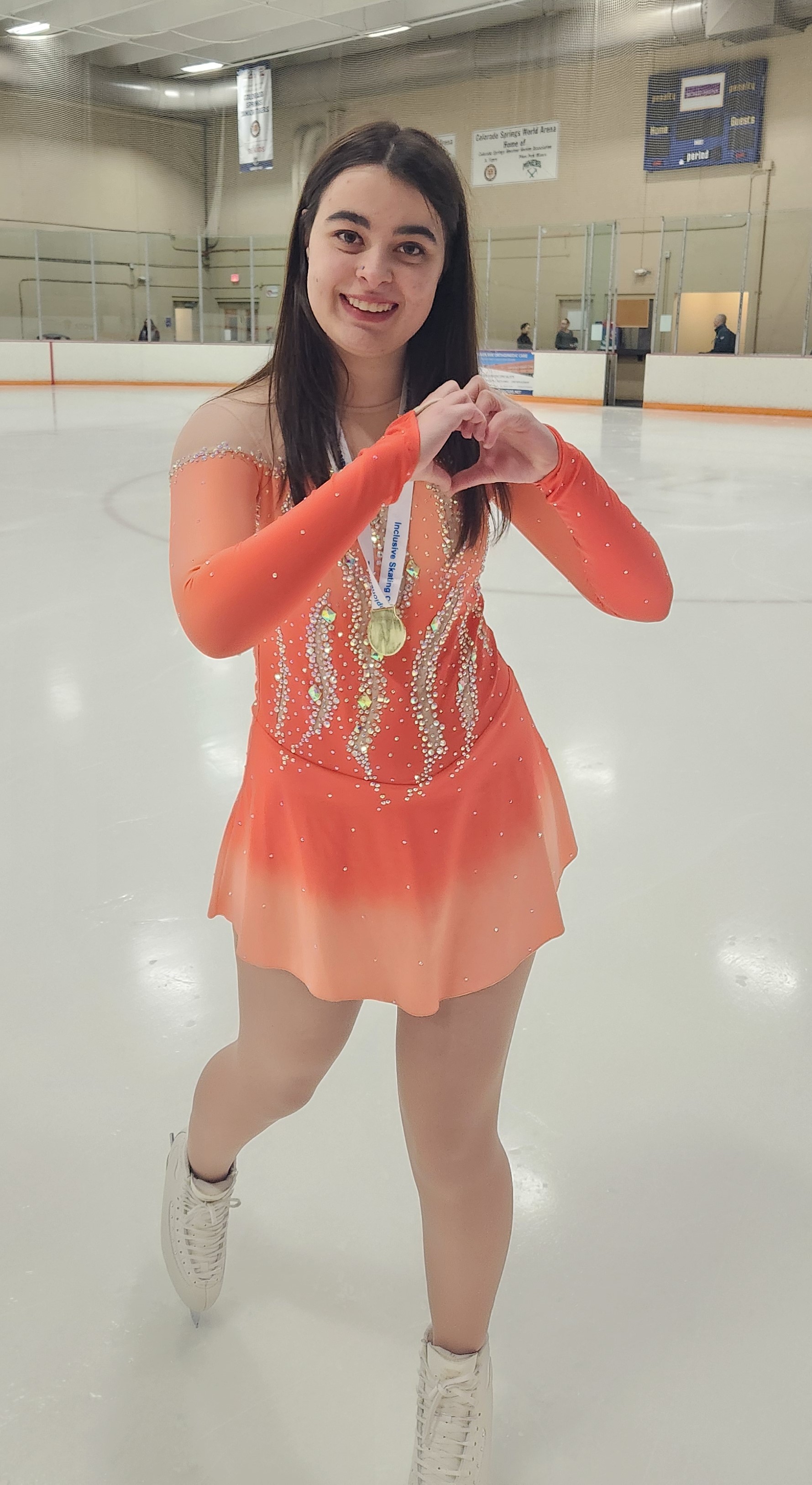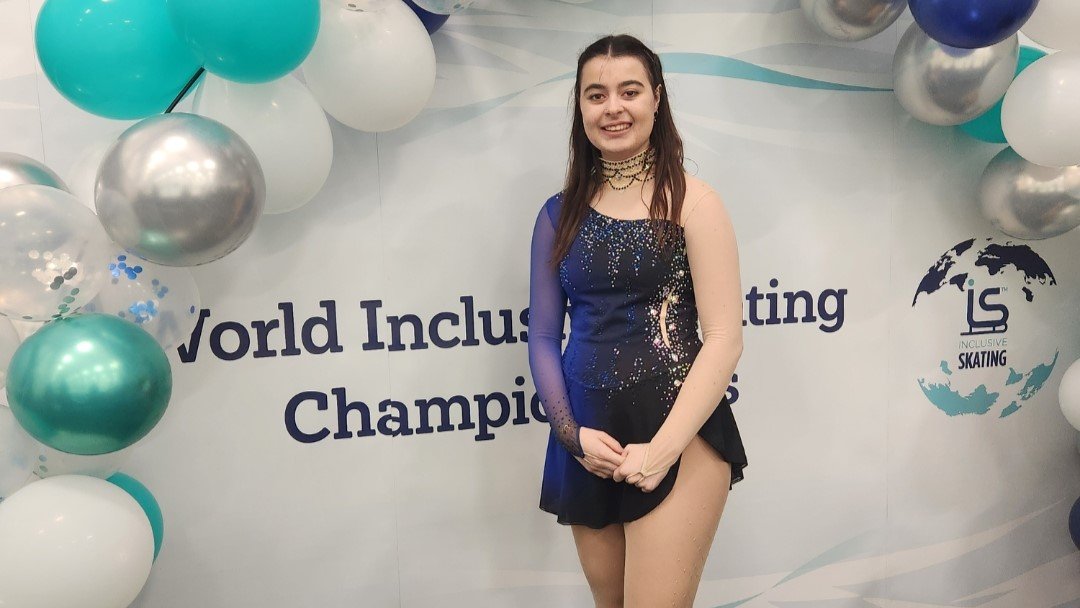By Robyn Clarke
When 17-year-old Dacia Loconte first saw figure skating on television at the age of 3, she was fascinated by the sport’s nuances and intricacies: She loved the sight of skaters meticulously landing triple Axels and effortlessly gliding across the ice to their soundtrack of choice. She saw herself in the athletes on the screen and knew she had to try her hand at being on the ice, too.
However, there were a few extra hurdles for Loconte to jump before she could step in the rink for the first time. She had experienced increased muscle tightness, and as a result, physical therapy had been a part of her routine since she was four months old. When she first approached her therapists about taking up skating, they were skeptical.

“They were scared I was going to trip on the ice and hurt myself, because when I walked, my feet would turn in,” she said.
Despite their hesitation, Loconte was determined. Eventually, her therapists cut her a deal: If she could develop enough motor skills to where falling was not a concern, they would clear her to skate.
Their words were all the motivation she needed. She went to work developing enough function to alleviate their concerns. Four years later, at the age of 7, she reached her goal.
Loconte was elated to finally have made it into a rink. Finally, she would be able to enjoy the sport that had captivated her for so long. However, despite feeling a sense of achievement, she knew the victory was just the beginning of her skating story.
As she progressed to more advanced aspects of the sport, Loconte noticed that it was difficult to perform certain movements. Sometimes, she would trip while she was performing, and other times, it was challenging to judge a rink’s spatial set up. She admits that the obstacles left a weight on her shoulders.
“‘What do I do? Where do I go?’” she thought. “Then, after a while, I just figured I might as well keep persevering anyway, because I learned how to work around it.”
Although she was able to adapt, she and her mother, Beth, began searching for the reason behind her experiences. Loconte underwent a series of medical tests and visited dozens of doctors, but nothing could explain her symptoms. Finally, when she was 13, she and Beth traveled 33 hours from Colorado Springs to Boston Children’s Hospital in hopes that the team there could provide insight.
The hospital’s staff offered the answers Loconte desperately sought. They determined that an injury to the cerebellum region of her brain at birth was what affected her ability to process her surroundings.
Loconte says receiving the diagnosis was a double-edged sword.
“Obviously, I wanted to find out, [but] by the time we went to Boston Children’s, I was kind of tired of medical stuff,” she said. “But I was also a little excited because I'd finally [gotten] an answer for things that I was wondering— like why I seem to be different from other kids my age, and why they noticed it so much.”
The discovery also allowed her skating coaches to better understand how to accommodate her in the rink. They began to film her performances, so she could review feedback through watching the footage, rather than having to listen to their feedback and figure out what they had meant. Her head coach at the time, Stephanie Kuban, went above and beyond to make sure everything was accessible to her.
“She went and researched the cerebellum and what needed to happen,” said Beth Loconte. “And she actually facilitated [conversation] with the other four coaches on how to change things for her. She just was amazing.”
Kuban’s compassion and care influenced Loconte beyond improving her skating.
“She kept asking me what I would physically feel when I did certain things,” she said. “One of the things I learned was to be more in tune with my body. For a long time, I had no spatial awareness of what my arms or face was doing, and now I’m a lot better at it, mostly because she kept asking.”
August of 2022 served as another crucial point in Loconte’s skating journey. It was then that she discovered Inclusive Skating, a nonprofit that facilitates events and activities for skaters with disabilities. A few months later, she found herself skating in her first virtual world championship.
Skating virtually was a little different than what Loconte was used to. Rather than performing in front of a crowd, she recorded her routine and submitted it to the organization. Then, she and the other competitors gathered on a Zoom meeting to watch the different performances together.
For Loconte, spending time with others who have disabilities was an impactful experience.
“It was the first time I got to be in an area with others with disabilities who are also skating,” she said. “It was amazing, because for the first time I was like, ‘Oh, I’m not dead alone anymore.’”
A few months later, the International Skating Union picked up Inclusive Skating as a program under their operations and went to work shifting the World Championships to an in-person format. Loconte had the opportunity to participate in the World Inclusive Para Skating Championships 2024 in London, England and found the experience to be equally impactful.
“I met a lot of different people with a bunch of different disabilities, [and] there were a lot of people who I just found really inspiring,” she said. “[Now], I’m way more motivated to get more of my doubles clean and do more clean programs.”
She hopes that audience members who watch her skate can take something away from it.
“I just want people to see me skate and be like, ‘It’s an option that [if you have a disability], you can come skate, too. I want [adaptive skating] to get bigger.”


